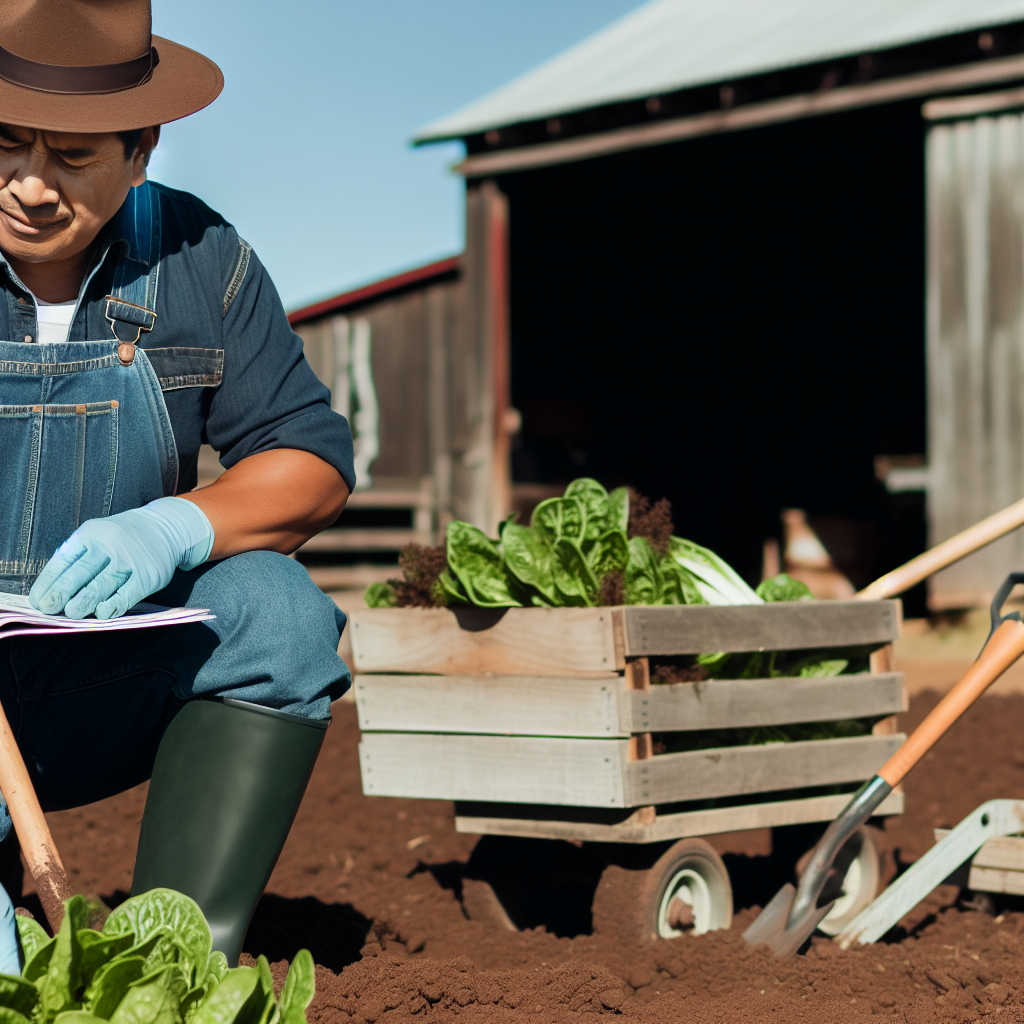Understanding the Importance of Food Safety Compliance for Small Farmers
Protection of Public Health
Food safety compliance protects public health effectively.
It reduces the risk of foodborne illnesses.
Moreover, consumers trust compliant farmers more.
Enhancing Market Access
Food safety compliance opens new markets for small farmers.
Many retailers require safety certification.
Additionally, compliance attracts consumer interest.
Building a Strong Reputation
A commitment to food safety enhances a farmer’s reputation.
It signals professionalism and responsibility.
Consequently, a strong reputation can lead to increased sales.
Cost-Effectiveness of Compliance
Investing in food safety can be cost-effective in the long run.
It reduces potential liability costs from food safety issues.
Furthermore, compliance can lower insurance costs.
Continuous Improvement and Best Practices
Food safety compliance encourages continuous improvement.
Farmers regularly assess and enhance their practices.
Consequently, this results in higher quality produce.
Transform Your Agribusiness
Unlock your farm's potential with expert advice tailored to your needs. Get actionable steps that drive real results.
Get StartedAdditionally, implementing best practices improves operational efficiency.
Regulatory Requirements
Understanding food safety compliance is crucial for small farmers.
Regulations are in place to ensure consumer safety.
Farmers must stay informed about local, state, and national laws.
Key Regulations and Standards Affecting Small Farm Food Safety
Overview of Food Safety Regulations
Food safety regulations are essential for protecting consumers.
These regulations govern the production and handling of food products.
Compliance ensures that food products are safe to eat.
Small farmers must understand these regulations to operate successfully.
Federal Regulations
The Food Safety Modernization Act (FSMA) transformed food safety practices.
It focuses on preventing contamination rather than responding to it.
FSMA requires farms to implement specific food safety measures.
Compliance with FSMA can help small farms maintain market access.
State Regulations
Each state has its own set of food safety regulations.
These can vary widely from one state to another.
Small farmers need to be aware of local rules and standards.
State agricultural departments often provide resources and guidance.
Organic Standards
Organic certification requires adherence to strict guidelines.
These guidelines govern how crops are grown and handled.
Farmers must avoid synthetic pesticides and fertilizers.
Maintaining organic certification can enhance market competitiveness.
Best Practices for Compliance
Understanding regulations is the first step toward compliance.
Farmers should regularly educate themselves about food safety laws.
Implementing a food safety plan is crucial for small farmers.
Documentation and record-keeping help demonstrate compliance.
Showcase Your Farming Business
Publish your professional farming services profile on our blog for a one-time fee of $200 and reach a dedicated audience of farmers and agribusiness owners.
Publish Your Profile- Conduct regular training for all staff on food safety practices.
- Create a comprehensive food safety manual tailored to the farm.
- Establish a schedule for regular audits and inspections.
Resources for Farmers
Various organizations offer resources for understanding regulations.
The USDA and local cooperative extension services provide invaluable materials.
Farmers can also attend workshops and training sessions.
Peer networks can offer support and share best practices.
Implementing Good Agricultural Practices (GAP) on Small Farms
Understanding Good Agricultural Practices
Good Agricultural Practices ensure food safety and quality.
They promote environmental sustainability and worker safety.
Additionally, GAP helps small farmers meet regulatory compliance.
Farmers must implement these practices to enhance marketability.
Establishing a GAP Plan
A well-focused GAP plan starts with identifying specific goals.
Small farmers should assess their current farming operations.
Next, they must identify potential risks to food safety.
Moreover, farmers should document their GAP procedures clearly.
Regularly updating the plan ensures continued compliance.
Training and Education
Effective training programs enhance employees’ handling of food products.
Farmworkers must understand the importance of hygiene and safety.
Moreover, ongoing education keeps farmers informed about best practices.
Consider scheduling regular workshops and training sessions.
Promoting Traceability
Implementing traceability systems is crucial in food safety.
This process tracks the journey of products from farm to table.
Farmers should maintain thorough records of all agricultural inputs.
These include seeds, fertilizers, and pest control substances.
Investing in technology can streamline this tracking process.
Regular Inspections and Audits
Conducting regular inspections helps identify areas for improvement.
Set schedules for internal audits to evaluate GAP implementation.
These audits should focus on compliance with safety protocols.
Furthermore, farmer-led inspections cultivate a culture of accountability.
Engaging with Certifying Bodies
Building relationships with certifying organizations is essential.
These bodies provide resources for understanding GAP standards.
Participating in certification programs enhances credibility.
Additionally, certified farms often command higher market prices.
Utilizing Technology for Compliance
Embracing technology can significantly enhance compliance efforts.
Using software for tracking and documenting agricultural processes is beneficial.
Moreover, innovative technologies can improve operational efficiency.
Many tools offer solutions for real-time monitoring of farm conditions.
Fostering Community and Networking
Engaging within a farming community offers numerous advantages.
Networking with other farmers provides valuable insights and resources.
Joining local agricultural groups promotes shared learning experiences.
Collaboration can lead to sharing resources, costs, and knowledge.
Find Out More: Common Misconceptions About Agricultural Insurance Policies
Developing a Comprehensive Food Safety Plan for Small Farms
Importance of a Food Safety Plan
A food safety plan protects consumers from foodborne illnesses.
Showcase Your Farming Business
Publish your professional farming services profile on our blog for a one-time fee of $200 and reach a dedicated audience of farmers and agribusiness owners.
Publish Your ProfileAdditionally, it enhances the reputation of small farms.
Compliance with safety regulations can also improve market access.
Assessing Risks
Start by identifying potential hazards on your farm.
Consider biological, chemical, and physical risks.
Engage with local agricultural extension services for guidance.
Utilize checklists to evaluate your current practices.
Developing Standard Operating Procedures
Create specific procedures for each aspect of your farm operations.
Include processes for planting, harvesting, and packaging.
Ensure that all staff are trained on these procedures.
Regularly review and update the procedures as needed.
Implementing Training Programs
Provide ongoing training to all employees on food safety practices.
Utilize workshops and hands-on demonstrations for better understanding.
Encourage feedback from staff to improve training effectiveness.
Keep documentation of all training sessions for compliance purposes.
Monitoring and Reviewing Practices
Establish a monitoring system to track food safety practices.
Conduct regular inspections of equipment and facilities.
Document any issues and correct them promptly.
Review your food safety plan annually for improvements.
Building Relationships with Local Health Departments
Foster a relationship with local health officials for support.
Attend meetings and share your food safety initiatives.
Utilize their resources and knowledge for compliance requirements.
A collaborative approach enhances community trust in your farm.
Find Out More: Sustainable Farming Under Water Restrictions
Conducting Regular Food Safety Audits and Assessments
Importance of Food Safety Audits
Food safety audits help ensure compliance with regulations.
They identify potential risks and weaknesses in food handling practices.
Regular audits promote a culture of food safety within the farm.
Creating an Audit Schedule
Establish a consistent schedule for food safety audits.
Frequency may depend on the size and type of farm operations.
Monthly audits can help maintain high standards effectively.
Developing Checklists for Audits
Customized checklists streamline the auditing process.
Include key areas such as handling, storage, and sanitation.
Regularly update the checklists to reflect best practices.
Documenting Audit Findings
Maintain thorough records of audit results.
Documentation supports corrective action and improvement efforts.
Establish a system for tracking trends over time.
Training Staff on Food Safety Protocols
Train all staff members on food safety practices.
Effective training enhances compliance and reduces risks.
Utilize workshops and hands-on training sessions.
Implementing Corrective Actions
Address any issues identified during audits immediately.
Establish a protocol for implementing corrective measures.
Showcase Your Farming Business
Publish your professional farming services profile on our blog for a one-time fee of $200 and reach a dedicated audience of farmers and agribusiness owners.
Publish Your ProfileFollow up on corrective actions to ensure effectiveness.
Reviewing and Updating Food Safety Plans
Regularly review and update food safety plans based on audits.
Adapt to changing regulations and industry standards.
Engage staff in the review process to encourage input.
Engaging External Auditors
Consider hiring external auditors for an objective assessment.
External auditors can provide valuable insights and recommendations.
Their expertise can enhance the farm’s food safety practices.
Uncover the Details: Challenges and Solutions in Food Safety Compliance for Farmers

Training Employees on Food Safety Protocols and Best Practices
The Importance of Training
Training employees is crucial for food safety compliance.
It helps prevent foodborne illnesses on the farm.
Proper training ensures everyone understands their responsibilities.
As a result, this reduces the risk of contamination.
Moreover, it creates a culture of food safety among the staff.
Identifying Key Topics for Training
Start by identifying essential food safety topics.
Topics should include proper hygiene practices.
Additionally, training on safe handling of produce is vital.
Incorporate knowledge of food storage temperatures too.
Lastly, include information about pest control measures.
Developing a Training Program
Create a structured training program for your employees.
Begin with an orientation on food safety policies.
Utilize both written materials and practical demonstrations.
Include hands-on training activities to enhance understanding.
Consider regular refreshers to keep knowledge current.
Engaging Staff in Training
Engage employees actively during the training sessions.
Encourage questions and discussions to reinforce learning.
Utilize role-playing scenarios to simulate real situations.
This method helps employees feel more confident.
Assessing Training Effectiveness
Regularly assess the effectiveness of your training efforts.
Use quizzes or practical tests to evaluate knowledge retention.
Gather feedback from employees to improve training materials.
Make adjustments as necessary based on their suggestions.
Documenting Training Sessions
It’s essential to document all training sessions conducted.
Keep records of participant attendance and materials covered.
Documenting helps demonstrate compliance during inspections.
Also, it provides a reference for future training sessions.
Encouraging a Culture of Food Safety
Create an ongoing culture of food safety on the farm.
Promote open communication regarding food safety issues.
Recognize and reward employees for following protocols.
This encourages adherence to best practices consistently.
Ultimately, a strong culture enhances overall food safety.
Showcase Your Farming Business
Publish your professional farming services profile on our blog for a one-time fee of $200 and reach a dedicated audience of farmers and agribusiness owners.
Publish Your ProfileYou Might Also Like: Understanding Organic Farming Standards
Utilizing Technology and Resources for Improved Food Safety Compliance
Implementing Food Safety Management Systems
Small farmers can benefit from adopting food safety management systems.
These systems help track compliance with food safety regulations.
They also assist in documenting farming practices effectively.
By utilizing these systems, farmers can enhance transparency.
Moreover, they improve the overall quality of food produced.
Leveraging Mobile Applications
Mobile applications can streamline food safety compliance processes.
Farmers can use apps to record data on farm activities easily.
They can also access educational resources on food safety standards.
Furthermore, tracking inventories becomes more manageable with these technologies.
Thus, mobile apps simplify daily operations on the farm.
Adopting Digital Traceability Solutions
Digital traceability solutions enhance the ability to track food products.
Farmers can quickly trace the journey of their produce.
This capability helps identify potential contamination sources rapidly.
In addition, it builds consumer trust through transparency.
Farmers who prioritize traceability will likely attract more customers.
Engaging with Online Training and Resources
Online training programs provide essential knowledge on food safety practices.
Farmers can learn about regulatory requirements at their own pace.
These resources cover various topics, from sanitation to proper handling techniques.
By participating in online learning, farmers can stay updated.
This ongoing education helps assure compliance with current standards.
Utilizing Government and NGO Support Services
Government agencies offer resources for small farmers to improve compliance.
These services include workshops, training sessions, and guidance materials.
Non-governmental organizations also provide assistance and advice.
By collaborating with these entities, farmers can enhance their practices.
This connection fosters a community that values food safety compliance.
Community Collaboration and Networking for Food Safety Improvement
Building a Supportive Network
Small farmers benefit greatly from community networks.
These networks provide valuable resources and information.
Collaborating with local farmers fosters knowledge sharing.
For instance, farmers can exchange safety practices effectively.
Additionally, shared experiences help in understanding challenges.
Participating in Local Food Safety Initiatives
Engaging with local food safety programs enhances compliance.
Farmers can participate in workshops and training sessions.
These initiatives often provide up-to-date regulatory information.
Moreover, local programs encourage collaboration among farmers.
Networking creates opportunities for peer support and mentorship.
Partnering with Agricultural Extension Services
Establishing connections with extension services is essential.
These organizations offer expert advice on food safety practices.
Farmers can access research and resources through these partnerships.
Additionally, extension services provide tailored assistance.
Showcase Your Farming Business
Publish your professional farming services profile on our blog for a one-time fee of $200 and reach a dedicated audience of farmers and agribusiness owners.
Publish Your ProfileThis approach supports compliance with food safety regulations.
Creating Joint Safety Programs
Collaborating on safety initiatives can spread costs and efforts.
For example, farmers can form cooperatives to implement programs.
Joint safety inspections can streamline compliance processes.
Additionally, sharing resources boosts efficiency and effectiveness.
Farmers benefit from collective learning through shared experiences.
Engaging in Community Workshops and Events
Participating in community events enhances food safety awareness.
Farmers can share insights and experiences with the public.
Additionally, these events provide platforms for discussing challenges.
Furthermore, farmers receive feedback on their practices.
Such interactions strengthen community ties and trust.
Additional Resources
Food Safety | Commonwealth of Pennsylvania
Development of Strategies to Achieve and Maintain Compliance …




